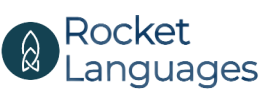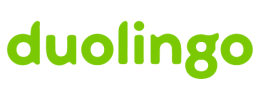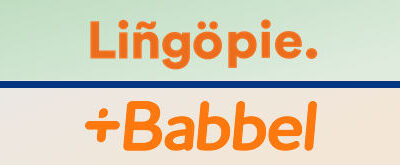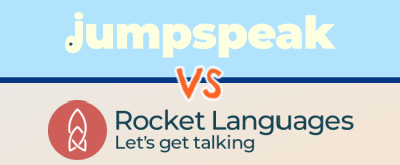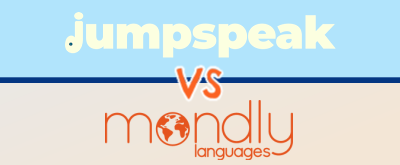Though Duolingo is possibly the most popular language app in the world, Rocket Languages is lesser known. However, that doesn’t necessarily mean Duolingo is better than Rocket Languages. Not by a long shot. In this comparison, we cover the pros and cons of each language program so you can figure out which one is right for you.
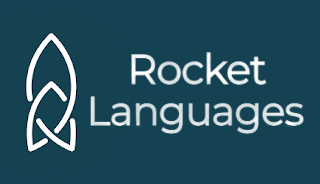
Sale: 60% OFF
Use Code: INSIGHT60
|
$180 lifetime |
Our absolute favorite app to learn a new language. With audio lessons, detailed grammar instruction, and diverse exercises, Rocket is the one-stop app. |
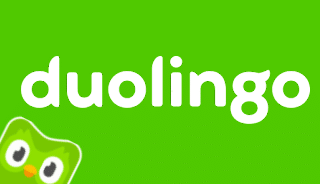
Free Version
Sign Up Today
|
$7/mo |
An app built around fun and fast lessons. We like the price tag and engagement, but this app is too gamified for us. Lots of fun, but not enough substance. |
Video Review: Which App Is Better?
In the video above, team member Bianca explains what she likes and doesn’t like about each app. Read on for more info.
Editor’s Choice
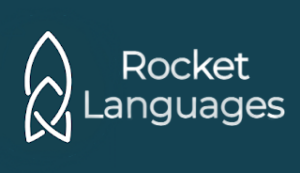
Rocket Languages
- Free Trial
- Money Back Guarantee
Pros
- Lessons are much more comprehensive than Duolingo’s lessons
- Interactive, engaging audio lessons (best in the industry)
- Dedicated grammar lessons
- Helpful cultural insights integrated into coursework
- Top-notch speech recognition technology
Cons
- Lessons are somewhat lengthy (45-60 mins)
- Wish lessons included more visual elements
How Each Language App Works
I want to begin my review with a high-level overview of how each language program works to help set the stage. Let’s start with Rocket Languages.
How The Rocket Program Works
To put it simply, the whole Rocket program begins and ends with audio lessons. To start each unit, you listen to an audio lesson, which is about a half-hour long. In this lesson, an English-speaking moderator will guide you through a conversation in the language you’re learning step-by-step.
You’ll listen to a sentence or two (or sometimes even just a phrase), before the moderator briefly stops to explain what’s going on, what you just heard, and have you engage in the conversation by answering questions and repeating phrases.
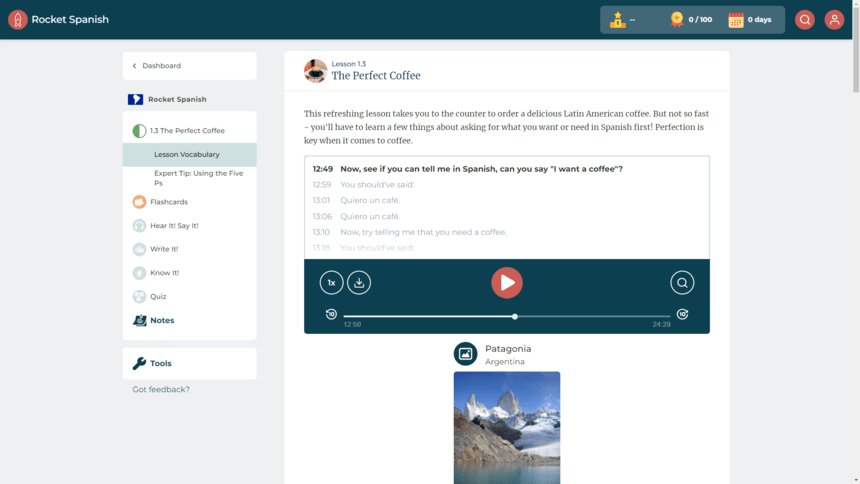
While you listen to the audio exercise, a rolling transcript plays underneath where you can keep up and see how words are spelled. Then after the audio lesson, you review and reinforce what you just learned through a variety of drills and exercises.
In this respect, it’s somewhat like class followed by homework. Not that you’ll feel like you’re back in school though.
These post-audio reinforcement drills include listen and repeat-type drills, flashcards, quizzes, and the chance to reenact the underlying conversation from the audio lesson by playing the part of the one of the two speakers. That last one is my favorite and it’s pretty useful.
However, that’s just the main portion of the Rocket Languages program. The other half of the lessons in each module are “language & culture lessons.”
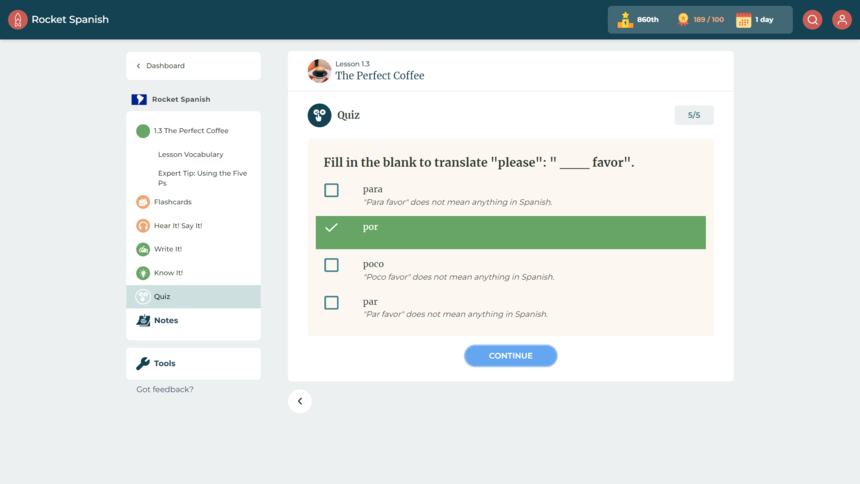
In these lessons, Rocket dives deep into a specific grammar principle, which they explain with short excerpts, examples and graphics. The point of these short lessons is to zero in on structural differences between the languages, plus have you learn some important cultural tidbits along the way.
That is more or less Rocket Languages though—audio lessons backstopped by reinforcement drills, with detailed grammar lessons as well.
How Duolingo Works
Duolingo, if you’re not familiar with it, is very different. The Duolingo lessons are a lot shorter and don’t have any core audio exercises like the Rocket Languages program.
The typical Duolingo lesson takes just 5 minutes and is essentially a set of rapid fire drills. These drills include listening exercises, speaking drills, fill-in-the-blanks, matching pairs, translations, and writing full sentences, among others.
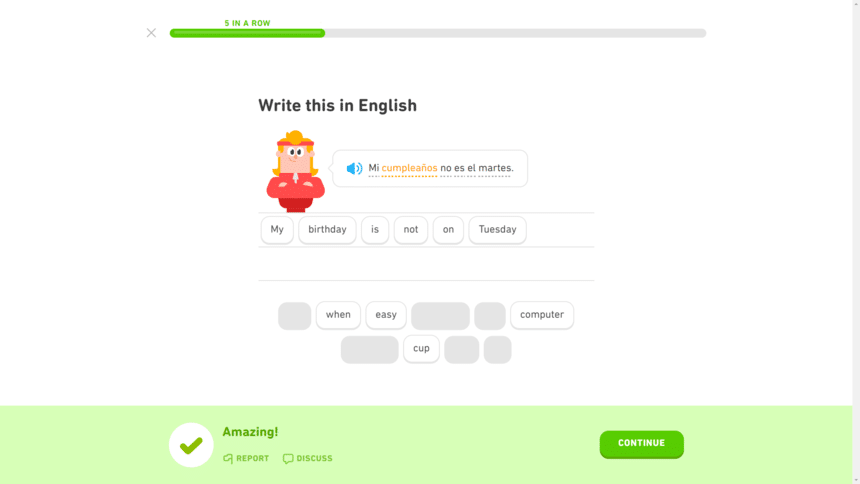
The lessons go by very fast, and a lot of times you’ll end up doing two or three Duolingo lessons in one session. Put another way, Duolingo’s lessons are a lot shorter and less comprehensive than Rocket’s.
They’re actually polar opposites of each other. However, that’s not the whole picture though, as Duolingo’s program is fundamentally different from Rocket’s. What I mean is that Duolingo isn’t just about lessons.
Their program is also meant to be like a game or social app. With Duolingo, you connect socially with friends, earn XP points, keep your streak alive, compete in leagues against other users, and buy things with gems from the store.
It’s much more game-like than Rocket’s program. In a way, one program feels like a true language learning course, and the other feels like a fun language learning tool—if that makes any sense.
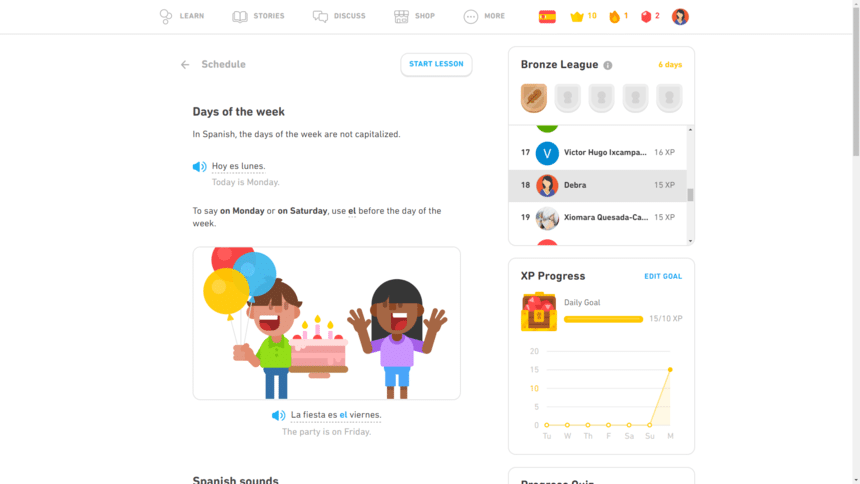
Nonetheless, that’s how the two companies generally compare. The big takeaway here is that the Rocket lessons take around an hour to complete from start to finish, and place a very strong emphasis on developing your listening and speaking skills with their audio lessons, while the Duolingo lessons are much shorter and intended to be like a fun game or social app.
Cost Comparison
Before discussing the pros and cons of each app, let’s quickly talk about cost.
Starting with Duolingo, most everyone knows them for being the free language app. Their basic subscription is totally free. You simply download the app, make a profile, and start doing lessons. It’s that easy.
And you get *most* all of the benefits they have to offer. Note the asterisks there, because there are some negatives.
The issue with the free version is that (1) you’re limited on how many mistakes you can make on a daily basis; (2) there are a bunch of ads; and (3) there are restrictions around navigating new and old lessons. Therefore, you must upgrade to Super Duolingo to rid yourself of these issues. That is their premium version.
It costs $84 for an annual subscription (i.e., $7 on a monthly basis), or you can sign up for the family plan if you care to split with friends or family. That costs $120 per year, or $10 on a monthly basis.
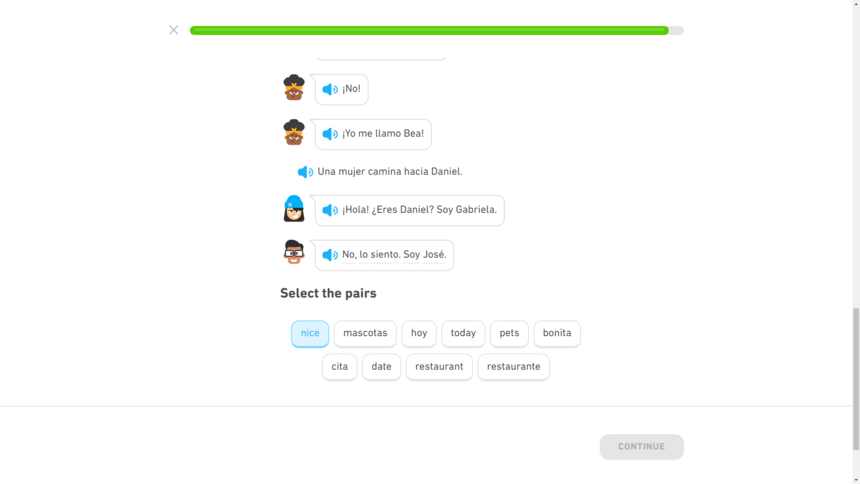
Rocket Languages, on the other hand, has a totally different pricing model. For one, there is no free version. And for two, they don’t do the subscription model.
Rocket only offers one-time purchase, lifetime plans. You buy a course and get access forever. These packages range from $150 to $450, depending on how many levels you want to purchase.
Thus, it’s a pretty different model and somewhat hard to compare. Obviously, Duolingo is cheaper, though I would just note that those Rocket Languages prices are a little misleading. Those are just the MSRPs and Rocket Languages is almost always running some sort of deal or special promotion with steep discounts.
Why Rocket Languages Is Better Than Duolingo
Having covered pricing and a general overview, let’s get into the pros and cons of each program.
Interactive Audio Lessons
The first major advantage of using Rocket is definitely the audio lessons. As noted earlier, these audio lessons are the heart and soul of this program, and what makes Rocket different from most other language apps (apart from maybe Pimsleur).
These audio lessons are incredibly engaging and do a great job of getting you to actually think under pressure and verbalize what you’re learning. What you’ll notice with a lot of other language apps is that they don’t have large doses of listening or speaking exercises.
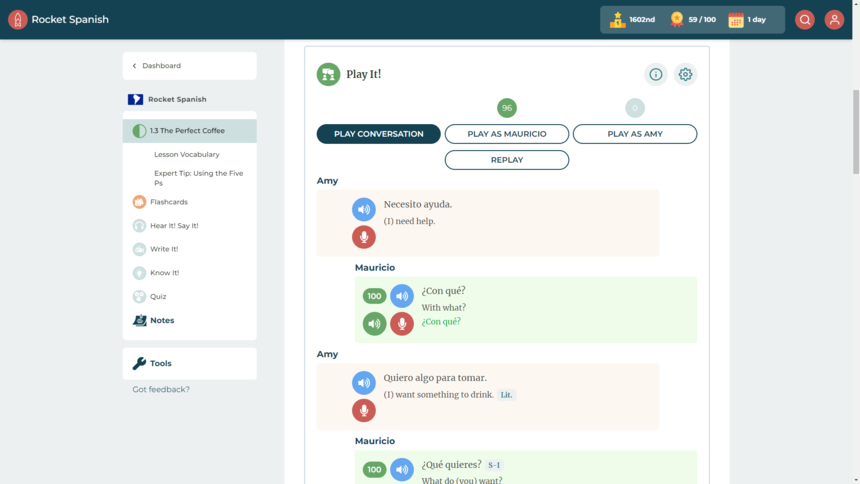
However, that’s literally 75% of the Rocket program, and to me, this is important as it’s the most powerful way of internalizing a new language and becoming comfortable with it.
You just have to hear a lot of your target language. Plus, one of the coolest parts of the Rocket audio lessons is that when you’re done, you can then play the underlying conversation that the lesson is built on in real time, and play the part of one of the two actors. It’s very effective.
Grammar & Culture Explanations
Another highlight of the Rocket program is the language & culture lessons. To be honest, one of my big complaints about Duolingo is that as part of their major update (late 2022), they really scaled back their grammar instruction.
Now, the only real grammar you get with Duolingo is through short guidebooks at the start of each unit, and they’re just very cursory.
With Rocket, however, you get in-depth language and culture lessons that dive deep into important grammar principles. While that might sound like too much, the nice thing is that they don’t clobber you with over-analysis.
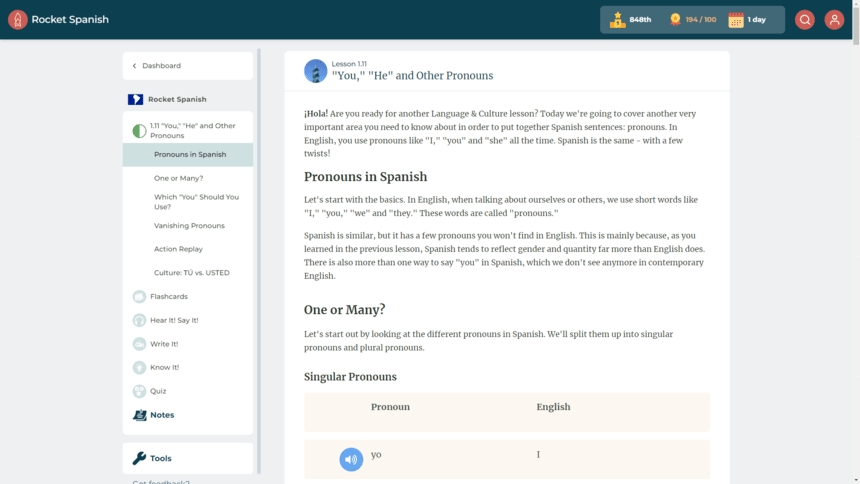
It’s usually just a quick 2-3 sentence explainer, followed by some examples. They’ll do that for a handful of points in each lesson, which I really like. Plus, they sprinkle in some cool cultural things about etiquette and manners as well, which I found helpful.
Accurate Speech Technology
My final win for Rocket is their speech recognition software. Between Rocket Languages and Duolingo, I prefer Rocket’s speech tech.
To me, Duolingo’s software just seems a little laggy and inconsistent, while Rocket’s is pretty darn accurate.
Rocket uses Google’s web speech API for their underlying software, which is really strong. Thus, if pronunciation feedback is important to you to work on your speech, I would strongly suggest looking into Rocket Languages.
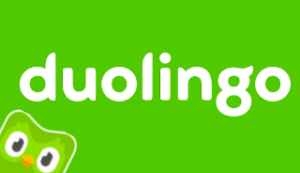
Duolingo
- 40+ Languages
- Free Version Available
Pros
- More affordable than Rocket
- Lessons are shorter and easier to complete
- Duolingo makes the learning process fun
- Wide variety of practice drills and exercises
Cons
- Free version is very limited
- Not as much emphasis on grammar content
- Limited verbal and speaking practice
Why Duolingo Is Better Than Rocket Languages
Let’s jump over to the highlights of the Duolingo app, as I have a few of them.
Fun Learning Experience
The clearest benefit of using the Duolingo app is how they gamify language learning. Rather than making the learning process an academic-type activity, they’ve designed their app to make the learning experience fun. And it legitimately is.
Duolingo is almost like an adventure game in a way (remember Zelda?) and you get kind of hooked.
You earn XP points with every lesson, you can do quests with friends, you can spend gems you earn on new features, you compete in leagues against other users, and they pump you up about keeping your daily streak up.
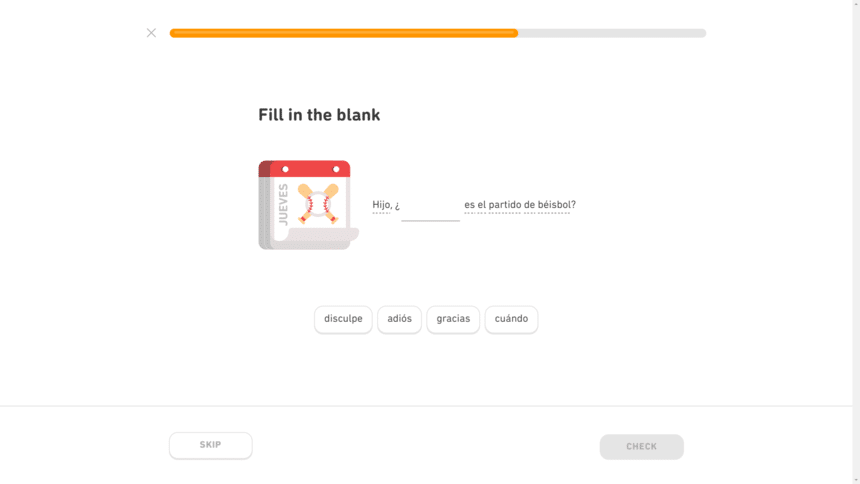
It’s just a really fun, addicting environment for learning, and I love that about Duolingo.
Free Version Available
Secondly, for those people looking to keep things budget friendly, I really like that Duolingo offers a free version. As noted earlier, without having to drop a cent, you can get most all of the features of the premium version.
It’s literally the only language app on the market that offers a halfway decent free version. Other language apps say they have free versions, but none of them are doable on a long term basis like Duolingo’s free version—not even close.
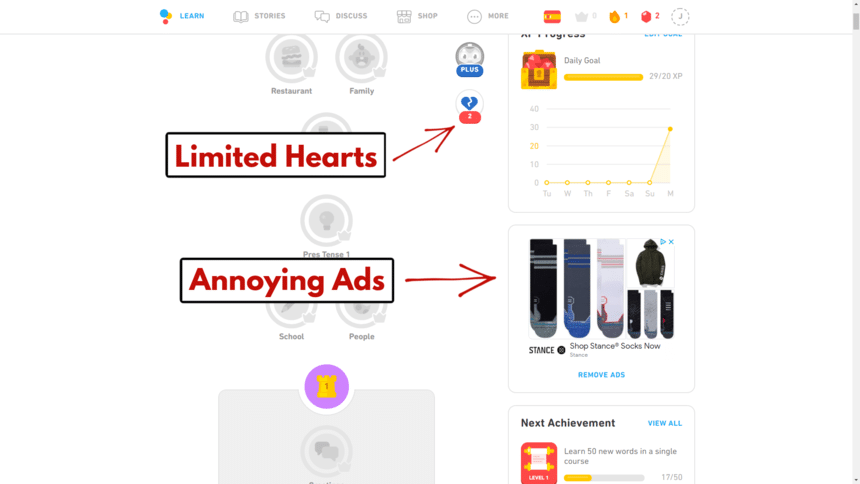
However, do keep in mind those restrictions I noted. You will get hit with a bunch of ad impressions, there are caps on your daily usage with their heart system, and it’s also a pain to navigate new and old lessons with the free version. Just bear that in mind.
Quick Lesson Format
My last pro for Duolingo is how short the lessons are. There is a major discrepancy in lesson length between these two companies.
Every Rocket lesson takes about an hour to complete from start to finish, while Duolingo’s lessons take just 5 minutes (similar to Babbel).
To be fair, you can pause Rocket’s lessons and always come back, but if you’re stretched for time and prefer to learn in bursts—maybe 5 minutes here or 10 minutes there—Duolingo might be the best option given how long the Rocket lessons are.
Verdict: Which Language App Is Better?
In terms of which program is more effective for helping you learn a new language, it’s not even close in my opinion—Rocket Languages wins this battle by a mile. With their audio lessons, reinforcement drills, killer speech software, and grammar lessons, their program is just much deeper and gives you all the tools you need to become fluent.
If you’re looking to just pick one app and stick with it, go with Rocket Languages.
However, that being said, there is some value to Duolingo—mostly as a supplement. In fact, that’s actually how I use Duolingo today. In my opinion, Duolingo makes for a nice complementary tool, as you can fill in gaps with their quick lessons and hammer vocab.
I would personally suggest using Rocket as your main program (perhaps doing 2-4 lessons per week), then rounding it out with a Duolingo lesson here and there to keep you motivated and building your vocab.
After testing each program, our team firmly believes that Rocket Languages offers the more comprehensive and effective language courses from top to bottom. Duolingo offers value, but Rocket’s program is better overall.
Lesson format is one of the key differentiators between Rocket and Duolingo. The Rocket lessons are much more comprehensive and center around interactive audio lessons, while the Duolingo lessons are much shorter and consist of several quick practice drills.
Yes, the Rocket Spanish program is much more comprehensive than the Spanish course from Duolingo. With in-depth audio lessons, Rocket Spanish is more immersive and effective.

